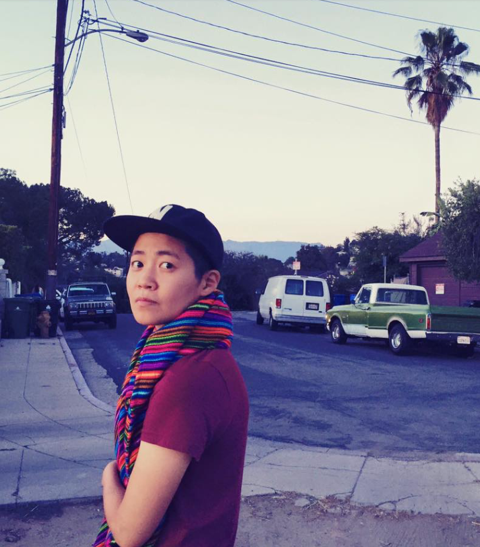42.1 Feature: An Interview with Patty Yumi Cottrell

Patty Yumi Cottrell’s work appears or is forthcoming in BOMB, Gulf Coast, and LIT, among other places. She lives and works in Los Angeles.
Interview by JOE LUCIDO
Black Warrior Review: The protagonist in “In the Room of Fathers” finds herself in a windowless and relatively unfurnished room with three men who claim to be her biological father. How did this idea come to you?
Patty Yumi Cottrell: The simple answer is I’m a Korean adoptee and when I was in my twenties, my biological father found me…It made me happy and nervous. Something else I felt as I wrote the story was a sense of sadness about my mother in Korea. She’s an optimistic and positive woman with lifelong terrible luck. Although I should say she has recently become a Buddhist nun, so perhaps she has finally reached a place of rest.
BWR: Reading this story, I’m struck by the formal decision of making the text narrower on the page than a traditional manuscript. It gives me a sense of constriction as a reader, in a way that mimics the confinement of the protagonist. Do you often give formal considerations like this to your work?
PYC: The writer Jesse Ball has taught me many things. One of the first things I learned from him was to give the work formal consideration, that one must treat it seriously.
BWR: Just now, writing this interview in the BWR office, I heard a bell ring in the hallway. I feel like this is a sign for me to ask a question about the role of the bell in this piece. It insistently chimes behind the discussion between the protagonist and the three men and is employed in the final scene, a signal of the protagonist’s biological mother. What role does the bell play in the relationship of the protagonist and her biological mother? Why a bell?
PYC: When I was very little my parents rented a large old house in Pittsburgh. I liked to crawl around everywhere. They tied bells to my ankles so they could find me. I suppose the bell functions as some kind of communication/disruption between the narrator, the biological mother, and the narrative itself. Or it doesn’t.
BWR: In the story, the protagonist expresses frustration about people always getting “the illogical mixed up with the absurd.” Do you find this sentiment informs your writing? What role does absurdity and surrealism play in your writing?
PYC: Absurdity is the rigorous and joyful practice of seeing the world as it is and then making something. It’s a humble approach to writing. When I write I like to picture myself as a lonely old man who has just taken a room in a decrepit boardinghouse. He sits at a desk and tries to write himself out of the present moment. Anything can happen.
BWR: What do you like most to read? Most influential books/authors?
PYC: Robert Walser I love for his lightness and exaggerated proportion. Other writers I admire: Thomas Bernhard, Clarice Lispector, everyone on Dorothy Press, Sheila Heti, Jesse Ball, Agnes Martin, Etal Adnan, Kosho Uchiyama Roshi, Brandon Shimoda, I could go on…
BWR: What are you working on right now?
PYC: I’m almost finished with a novel, an anti-memoir, about a Korean woman who goes home to Milwaukee to investigate the suicide of her adoptive brother. It’s a dark comedy.